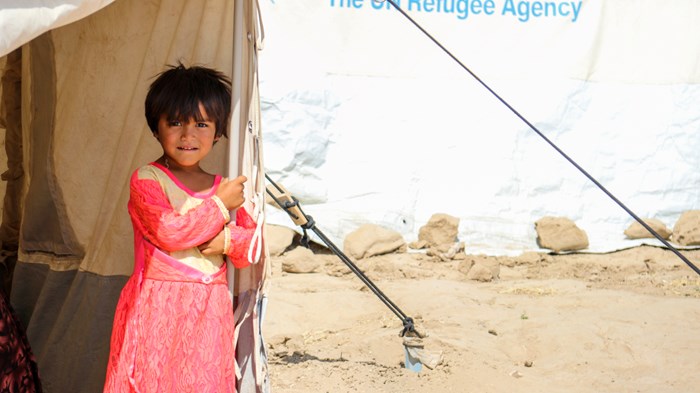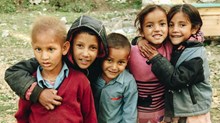Wondering about Sponsoring a Refugee? Here’s How It Worked for One Volunteer

The Sponsor Circle Program for Afghans is an emergency coalition initiative that supports Afghan newcomers already in the United States. Here’s one story of one Montana group that formed to host a refugee family. To apply to become a certified sponsor circle, visit Sponsor Circles to learn more.
Kent Annan, Director of the Humanitarian & Disaster Leadership Program at Wheaton College, interviewed HDL student Nancy Van Maren about her experience with the Sponsor Circle.
How did you become involved with the humanitarian crisis of Afghan evacuees fleeing Kabul and coming to U.S. military bases?
I got involved through my enrollment in the graduate program in Humanitarian and Disaster Leadership at Wheaton College. The program’s director, Kent Annan, learned of the need for volunteers to help welcome evacuees at US military bases and made the opportunity available to students who could move quickly with little information.
Interestingly, just three weeks earlier, a group of us hosted a representative from World Relief, Matthew Soerens, to build support in our community for a refugee resettlement office. At the time, Kabul had not yet fallen, but Soerens expressed he was quite concerned about how the US departure would play out for Afghans. His concern sensitized me to the great, impending need, and I started reading everything I could about the situation.
When you left after serving on the base, did you already have a plan in mind? Or what gave you the idea?
It was sad and hard to leave the base because it seemed like my ability to help the people I had grown to love in some way had ended. I remember saying to a close friend on base that I wanted to host Afghans in my home for dinner more than anything, but that it was just impossible.
The opportunity of creating a Sponsor Circle emerged in October when we heard about this new capacity-building program. One of our group members that was working with us for over a year to get a resettlement office here, heard the news piece and we jumped on it right away. We saw it as our opportunity to *be* a resettlement agency without having one here–a way to both learn the ropes and to convince a resettlement agency we could do it successfully.
Can you briefly explain how you explored this idea – who did you talk with, how did you try to pull together the people you would need to move forward, what seemed like it would be easiest, and what seemed most daunting?
I think our process was likely easier than many. Looking back, it went unbelievably smoothly. Our community group already had communication channels established, so all we had to do was find a time for busy people to meet. For the first Sponsor Circle meeting, I put together an agenda based on the application requirements found on the Sponsor Circle website. We went down the list of information that would be needed and–remarkably–people around the table called out which parts they would pull together. My primary role was to collect the information from all the contributors, follow up with questions, and compile it into an application, filling in holes as needed.
We might have all had different ideas of what would be easiest and most challenging. When we began, I thought fundraising would be the toughest and didn’t give much thought to translation, given that I had spent time with many translators on the base. It turns out I got that exactly backwards, by the way! Funds and other donations literally flowed in, and we weren’t able to identify a single Pashto speaker locally who could help us. Overall, though, the greatest limiter is housing: a community can only welcome as many Afghans as they can find affordable and appropriate housing for, and, ideally, that housing will have access to public transportation.
How many people were part of your Sponsor Circle?
Five people out of the group of 8 or so were official signatories to the application.
Can you describe the process of preparation, what you’ve been focused on, what are the essential things that you have to get in place to be rightly ready for the family?
The process of preparation began with our coming together over a year ago around a common interest. Our group is theologically and professionally diverse, and several members of the group of 8 are very well connected in our community. It was lovely to watch people giving from their strengths: housing, fund raising, language class preparation, access to legal expertise, fundamental resources, personal budget preparation, knowledge of benefits and the application process, cultural connections, and community awareness. To some extent, we each focussed on our areas of expertise or interest, and I just pulled it all together administratively.
We have learned a lot from a non profit that supports Montana’s only resettlement office in Missoula. We learned about welcome kits and language classes and the early needs of refugees from conversations with them.
If I had to identify the single most impactful step of preparation, it would be the informational communications that have gone out to a large email list of already-intrigued community members. Through only a few updates, the circle of support has expanded exponentially. I have fielded dozens and dozens of phone calls and emails over the weeks of preparation, as have several others. We have created spreadsheets to track needs and match them up with volunteers, and we have worn out the airwaves with our communications with each other–trying to coordinate this BIG something new.
We’re excited that you and your community are seeking to welcome in this way. We’ll check in with you in a few months as you learn more about how it’s going and what you’ve learned. But before the arrival, as you prepare personally, what has been most important to your preparation–through your time in the HDL program, other experiences in your life, spiritually?
Two things come to mind:
-
First, the class I took in the HDL program on refugees and forced migration provided detailed information about immigration, the refugee system, history, policy, process–all of which has enhanced my credibility when speaking about this process and the need. I returned from the base with the passion to do something more, but I needed the concrete “data” and a facility of sharing it in order to drum up support in my community.
-
Second, I have been reminded over and over and over again that this is the Lord’s work. We have marveled that we feel like spectators most days, as we watch people and material resources come together. We have witnessed hearts being softened and the community become welcoming, through no ability any of us possessed. Sometimes, even, we have received the meeting of a need at the same time we became aware of it… It’s a miraculous process that leaves me filled with gratitude and joy. God’s goodness is so apparent in this moment and in this space.
Nancy Van Maren is in her last semester as an HDL student at Wheaton. Prior to enrolling in HDL, Nancy had a career in public policy and administration and has written and taught professionally. Currently, she and her husband live in Montana, which she hopes to keep as a “home base” in future humanitarian work.
The Better Samaritan is a part of CT's
Blog Forum. Support the work of CT.
Subscribe and get one year free.
The views of the blogger do not necessarily reflect those of Christianity Today.






















